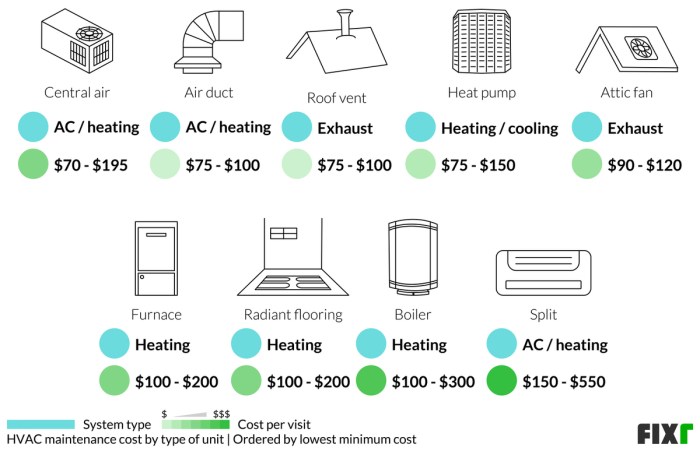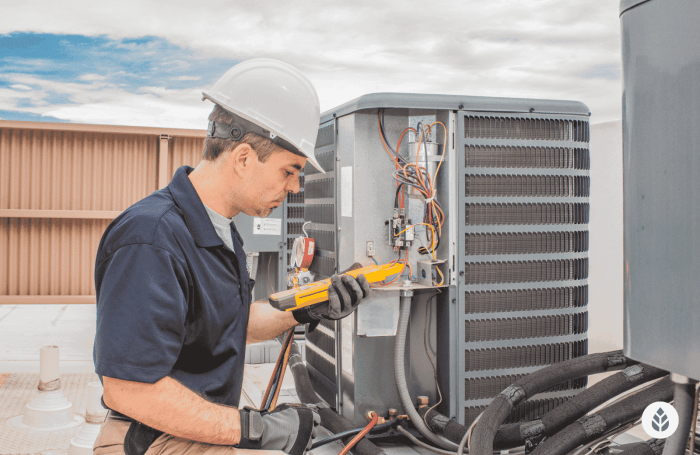Cost for HVAC Maintenance: Factors, Breakdown, Strategies, and Comparison
Exploring the costs associated with HVAC maintenance can shed light on the various factors influencing expenses, breakdown of services, strategies to reduce costs, and the comparison between DIY and professional maintenance. This comprehensive guide aims to provide valuable insights into managing HVAC maintenance costs effectively.
Factors influencing HVAC maintenance costs
When it comes to the cost of HVAC maintenance, there are several factors that can influence the overall expenses. Factors such as the age of the system, frequency of maintenance, type of HVAC system, location, accessibility, and complexity of the system all play a role in determining maintenance costs.
Age of the system
The age of the HVAC system can significantly impact maintenance costs. Older systems may require more frequent repairs and part replacements, leading to higher maintenance expenses over time.
Frequency of maintenance
Regular maintenance is key to keeping HVAC systems running smoothly and efficiently. Systems that receive routine maintenance tend to have lower overall costs compared to those that are neglected and require more extensive repairs.
Type of HVAC system
The type of HVAC system in place can also affect maintenance costs. For example, more complex systems or those with specialized components may require specialized maintenance services, which can be more costly.
Location and accessibility
The location of the HVAC system and its accessibility can impact maintenance costs. Systems located in hard-to-reach areas or in regions with extreme weather conditions may require additional time and resources for maintenance, leading to higher costs.
Complexity of the system
The complexity of the HVAC system, including the number of components and advanced technologies involved, can also influence maintenance costs. Systems with intricate designs may require more specialized maintenance and skilled technicians, resulting in higher expenses.
Cost breakdown of HVAC maintenance services
When it comes to HVAC maintenance costs, it’s important to understand how the different components contribute to the overall price. Let’s break down the typical components of HVAC maintenance costs and explore how each aspect impacts the total expense.
Labor Costs
Labor costs are a significant part of HVAC maintenance expenses, as skilled technicians are required to inspect, clean, and repair HVAC systems. The expertise and experience of these professionals contribute to the overall cost of maintenance. On average, labor costs can range from $75 to $150 per hour, depending on the complexity of the job.
Materials and Parts
Materials and parts used for HVAC maintenance, such as filters, lubricants, and replacement components, also add to the overall cost. These items are necessary for routine maintenance tasks and repairs. The cost of materials can vary based on the type of HVAC system and the specific parts needed.
For example, a standard air filter can cost between $10 to $20, while a new thermostat may range from $50 to $200.
Inspections and Tune-Ups
Regular inspections and tune-ups are essential for maintaining the efficiency and performance of HVAC systems. These preventative maintenance services help identify potential issues before they escalate into costly repairs. The cost of inspections and tune-ups can range from $100 to $200, depending on the scope of the service and the size of the HVAC system.
Repairs and Replacements
Inevitably, HVAC systems may require repairs or replacements of faulty components. The cost of repairs and replacements can vary significantly depending on the extent of the damage and the specific parts needed. For example, repairing a refrigerant leak can cost between $200 to $1,500, while replacing a compressor can range from $1,500 to $2,500.Overall, the breakdown of HVAC maintenance costs includes labor, materials, inspections, and repairs, all of which are essential for ensuring the longevity and efficiency of HVAC systems.
Strategies to reduce HVAC maintenance costs

Regular maintenance of HVAC systems is crucial in order to prevent costly repairs and ensure optimal performance. By implementing some cost-effective strategies, you can minimize HVAC maintenance expenses and extend the lifespan of your system.
Schedule Regular Maintenance Checks
- Set up a regular maintenance schedule with a professional HVAC technician to inspect and service your system at least once a year.
- Proactive maintenance can help identify potential issues early on, preventing them from turning into major problems that require expensive repairs.
- Regular maintenance can also improve the efficiency of your system, reducing energy consumption and lowering utility bills.
Change Filters Regularly
- Dirty air filters can restrict airflow and strain the HVAC system, leading to increased wear and tear.
- Make sure to change filters every 1-3 months, depending on usage, to maintain optimal performance and reduce the risk of breakdowns.
- Regularly replacing filters is a simple and cost-effective way to improve indoor air quality and prolong the life of your HVAC system.
Keep Outdoor Units Clean
- Clear debris, leaves, and other obstructions from the outdoor unit to ensure proper airflow and prevent overheating.
- Regularly clean the coils and fins of the outdoor unit to maintain efficiency and prevent potential malfunctions.
- Trim vegetation around the outdoor unit to prevent blockages and ensure adequate ventilation.
Comparison of DIY vs. professional HVAC maintenance costs
When it comes to HVAC maintenance, homeowners often face the decision of whether to tackle maintenance tasks themselves or hire a professional technician. Let’s explore the cost comparison between DIY maintenance and professional HVAC services.
Cost Comparison
- DIY Maintenance:
- Cost: DIY maintenance typically involves purchasing tools, filters, and cleaning supplies, which can add up but are generally more affordable compared to professional services.
- Pros: Saves money on labor costs, allows for flexibility in scheduling maintenance tasks, and can be a satisfying hands-on experience for some homeowners.
- Cons: Lack of expertise and knowledge may lead to incomplete maintenance, overlooking critical issues, or causing damage to the HVAC system.
- Professional HVAC Services:
- Cost: Hiring a professional HVAC technician comes with labor fees, service charges, and potentially higher costs for parts or repairs, making it more expensive upfront.
- Pros: Ensures thorough inspection and maintenance by trained professionals, reduces the risk of errors or damage, and may uncover underlying issues that DIY methods might miss.
- Cons: Higher initial costs, limited control over scheduling, and reliance on external expertise for maintenance tasks.
Cost-Effectiveness Analysis
- DIY Maintenance:
- When Cost-Effective: DIY maintenance can be cost-effective for routine tasks like filter replacement, cleaning, and basic inspections that homeowners can easily handle without specialized knowledge.
- When Professional Assistance is Necessary: For complex repairs, system troubleshooting, or issues requiring technical expertise, hiring a professional HVAC technician is more cost-effective in the long run to prevent costly mistakes.
- Professional HVAC Services:
- When Cost-Effective: Professional services are cost-effective when dealing with complex repairs, system upgrades, or maintenance tasks that require specialized skills and equipment beyond the scope of DIY efforts.
- When DIY Maintenance is Feasible: For regular maintenance tasks that do not require professional intervention, opting for DIY methods can help save costs without compromising the system’s performance.
Final Review

In conclusion, understanding the cost dynamics of HVAC maintenance is essential for homeowners and businesses alike. By implementing the right strategies and making informed decisions, it is possible to optimize maintenance expenses while ensuring the longevity and efficiency of HVAC systems.
User Queries
What factors can impact HVAC maintenance costs?
Factors such as system age, maintenance frequency, type of HVAC system, location, accessibility, and system complexity can influence maintenance costs.
How do labor, materials, and inspections contribute to overall HVAC maintenance costs?
Labor, materials, and inspections are key components that contribute to the overall cost of HVAC maintenance. Labor costs for technicians, materials for repairs, and inspection fees all play a role.
Is regular maintenance important in reducing HVAC maintenance costs?
Yes, regular maintenance is crucial in preventing costly repairs and minimizing overall HVAC maintenance expenses.
When is it more cost-efficient to opt for professional HVAC maintenance?
Professional HVAC maintenance is generally more cost-efficient when dealing with complex systems, major repairs, or when specific expertise is required.




